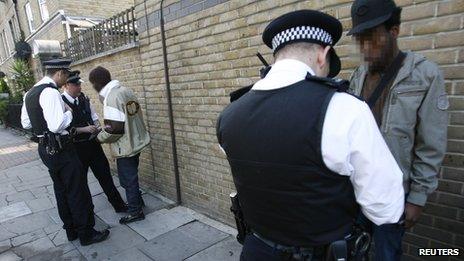Stop and search used 'disproportionately' on black and Asian people
- Published

Police say stop and search is an important crime-fighting weapon
Black and Asian people are still far more likely than white people to be stopped and searched by police in England and Wales, a report has said.
The Equality and Human Rights Commission (EHRC) said in some areas black people were 29 times more likely to be stopped and searched.
Overall, black people were six times as likely as white people to be stopped.
The commission said the disproportion between different ethnic groups remained "stubbornly high".
The EHRC's report, external for 2011-12 did not include stops carried out under anti-terrorism laws.
There are two key powers for stop-and-searches in England and Wales , externaland the majority are conducted under Section 1 of the Police and Criminal Evidence Act (Pace).
The figure for these searches fell to 1,137,551 in 2011-12 from 1,222,378 the previous year.
Those from Asian or other ethnic minority groups were twice as likely to be stopped as white people.
'Useful power'
To search a person or vehicle under Pace, police must have reasonable grounds for suspecting that stolen or prohibited articles, such as an offensive weapon, will be found.
The highest "disproportionality" ratios were found in the following places:
In Dorset black people were 11.7 times more likely than white people to be stopped and searched
In West Mercia, Asian people were 3.4 times more likely than white people to be stopped and searched
In Warwickshire, people of mixed race were 4.4 times more likely than white people to be stopped and searched.
The report also looked at the use of Section 60 of the Criminal Justice and Public Order Act 1994, which was originally introduced to tackle football-related disorder. Under Section 60, police can stop and search someone for weapons, without suspicion that the individual is involved in wrongdoing, providing that a senior officer has a reasonable belief that violence had or is about to occur. The stops under this power can only take place in a specific area for a limited time.
The number of Section 60 stops dropped by nearly a quarter from 60,963 in 2010-11 to 46,961 in 2011-12.
The report found that, of the 10 forces with the most Section 60 stops in 2011-12, the highest disproportionality ratios were found in the following places:
In the West Midlands, black people were 29 times more likely than white people to be targeted
In the West Midlands, Asian people were six times more likely than white people to be targeted
In Thames Valley, people of mixed race were 10.4 times more likely than white people to be targeted
EHRC chief executive Mark Hammond said stop and search was "a useful power".
"If it is used proportionally and intelligently the police can protect the public, reduce crime and disorder and improve relations with black and ethnic minority groups," he said.
"Much work has taken place over the last few years by some police forces to address racial imbalance in their use of stop and search.
"However, the overall disproportionality in the use of the powers against black, Asian and mixed race people remains stubbornly high."
New limits
In July, Home Secretary Theresa May said it was "time to get stop and search right" as she launched a six-week public consultation on police powers in England and Wales.
At the time, she said "everybody involved in policing has a duty to make sure that nobody is ever stopped just on the basis of their skin colour or ethnicity".
A week later, the Inspectorate of Constabulary found in a report that police in England and Wales failed to record the "reasonable" reasons for stopping and searching people in 27% of 8,783 cases examined.
In those cases, it found that either no grounds had been recorded or the officer had entered a reason which would not justify a search, such as speeding.
In January 2012, Metropolitan Police commissioner Bernard Hogan-Howe announced new limits on the issuing of Section 60 stop and search orders.
Officers have traditionally defended their right to use the approach as a tactic, which they say helps target drug and knife crime.
But the disproportionate use of section 60 powers on black youths, combined with a low arrest rate, has led to accusations of racial profiling.
Deputy Commissioner Craig Mackey, of the Association of Chief Police Officers, said: "We support the proper use of stop and search.
"The police service recognises and understands the concern that it does cause within communities but we know it works well when carried out with the support and understanding of the local community.
"Stop-and-search powers are critical in our efforts to tackle knife, gun, gang and drug-related crimes. It is, however, important that there is an on-going debate around the effectiveness of this police tactic as we seek to balance the impact of it on communities with the need to protect them from serious crime."
- Published9 July 2013
- Published2 July 2013
- Published12 June 2012
- Published17 January 2012